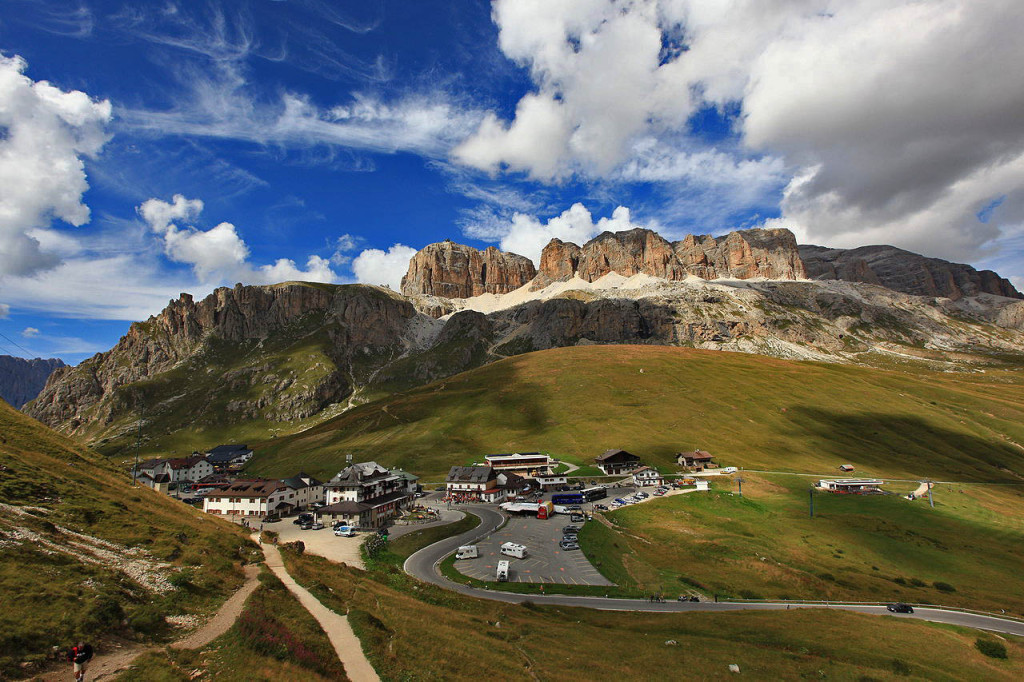Idee per promuovere un territorio
Eccomi di ritorno dal Week Economy Festival di Cesena dello scorso 21-23 marzo con nuove idee, neanche tanto nuove però. 🙂 Infatti quella della promozione di un territorio, piuttosto che di una regione, provincia o città, è un argomento che mi rimugina in testa da un bel po’, già da diversi anni* (confermato che non sono il solo), prima della crisi, ma è una mia semplice idea, che di questi tempi potrebbe forse essere presa un po’ più sul serio.
Chi lavora nel settore del turismo (e non solo) sa che non esiste un progetto di promozione nazionale, o per lo meno non esiste un progetto serio che abbia funzionato in questi anni. Quindi ogni regione si arrangia a se e fa promozione con le proprie risorse e soprattutto con il proprio metodo. Non solo però, spesso ogni regione si divide ulteriormente in provincie o città che fanno promozione per proprio conto.
Noi italiani, che ci piacciono le cose complicate, riusciamo in qualche modo a districarci tra le varie proposte commerciali sul nostro territorio. Ovvero, se andiamo in Toscana sappiamo benissimo cosa troviamo tra Firenze, Viareggio o Siena, se andiamo a Rimini sappiamo che c’è il mare e vita notturna, nel Trentino si trovano le Dolomiti, ecc.. Però diamo per scontato che tutti conoscono bene il nostro territorio e soprattutto diamo per scontato che lo conoscono anche all’estero. Ma non è più così e più passa il tempo, più avremo difficoltà ad attirare nuovi turisti.
I dati statistici parlano chiaro, perdiamo posizioni su posizioni nel mercato mondiale del turismo nonostante abbiamo tutte le capacità di essere, non tra i primi, ma i primi! Per nostra fortuna ci conoscono ancora con il marchio made in Italy (soprattutto su altri prodotti che non siano per forza legati al turismo), ma sempre meno ci conoscono con il nome delle regioni.
Quale potrebbe essere quindi la soluzione? Iniziare fin da subito a pensare in grande! Basta promuovere le singole regioni o peggio provincie e singole città da sole, ma promuoviamo i territori. Così per esempio possiamo promuovere nel suo insieme il mare, le montagne, le città d’arte, ecc… in territori. Le Dolomiti nel suo insieme tra Trentino, Alto Adige e Veneto (cosa che viene fatta in parte dal Dolomiti Superski con l’unione degli impiantisti in inverno, ma occorre un ulteriore passo da parte delle provincie). La riviera romagnola si promuove già nel suo insieme, ma è comunque legata alla regione Emilia Romagna e non credo che un olandese cerchi su Google riviera romagnola, piuttosto “Mare Italia”. Quindi un primo passo potrebbe essere unire le forze tra regioni. Si guadagnerebbe non soltanto in visibilità, ma anche in costi e di questi tempi non è poco.
Restando sul territorio che più conosco ovvero le Dolomiti, osservo che anche qui abbiamo la nostra “guerra” promozionale sulle montagne tra Trentino, Alto Adige e Veneto. Abbiamo per esempio il gruppo dolomitico del Sella e Pordoi che tocca tutte e tre le province e nel passato recente non sono state poche le battaglie. Ma al turista tutto questo non importa. Quando si trova sul Passo Sella o Pordoi al turista non importa che sta guardando le Dolomiti del Trentino, del Veneto o dell’Alto Adige, importa che sta guardando le Dolomiti. E questo vale per qualsiasi territorio nazionale.
Abbiamo una prova lampante che la promozione territoriale funziona, le OTA: Booking, Tripadvisor, Trivago, ecc… Se cerchiamo per esempio con booking un albergo per territorio “dolomiti”, questo lo trova indipendentemente se l’albergo si trova a Cortina, a Ortisei oppure a Madonna di Campiglio. E’ uno dei motivi del successo di booking (non l’unico però).
Forse le APT delle regioni dovrebbero abbandonare la vendita delle camere e concentrarsi sulla promozione del territorio creando delle alleanze tra regioni?
#WEFestival una delle cose più inutili del mondo: le piattaforme di prenotazione delle apt regionali … impossibile competere con i big OTA
— Anton Sessa (@AntonSessa) March 23, 2014
Una cosa è certa, se vogliamo tornare ad essere i primi sul turismo in Italia dobbiamo cambiare metodo promozionale e soprattutto mentalità: meno campanilisti e più orgogliosi dell’intero territorio nazionale!
Focalizzarsi non sul prodotto, ma sulla domanda. Ecco. Facile, no? #WEFestival
— Andrea Zironi (@azironi) March 23, 2014
* ho creato il Dolomiti Network già nel 1998 con l’intento di allargare la promozione del territorio delle Dolomiti non solo in Val di Fassa dove lavoro, ma sull’intero territorio dolomitico. Ma ahimè non soltanto ogni singola valle della stessa provincia viene promossa a sé (vedi Fiemme e Fassa confinanti), ma c’è competizione promozionale all’interno della stessa valle tra paesi e tra alberghi dello stesso paese.


Anton,
My experience, maybe unique, maybe not, is this;
I began searching the Dolomites, as a possible location, after visiting Lauterbrunnen, SW., 2 years ago, and Hallstatt, Austria last year. I’m finding my passion for outdoors and mountain walking/hiking growing.
This year we are visiting Val di Funes, but that started out as Cortina D’Ampezzo. For me the draw is the serenity of funes with the photos of Santa Magdelina. Cortina D’Ampezzo, a much more modern, and well known ski resort town, just seemed too busy, and more expensive. So I began looking around on Google Earth and using photos (Panoramio). When I found a location, I began searching additional information, using TripAdvisor, google, viator, etc. During my search I ran across several websites “sudtirol” was very helpful, and it led me to my lodging choice, via Red Rooster. We haven’t stayed on a farm yet, but we don’t generally like big chain hotels, or big hotels in general. We find Inns as comfortable, and far more personable. We’ve stayed in these small, 20 rooms or less, inns several times, and prefer this amount of anonimity, but personal interaction with the owners and their staff. So we chose Gaseid Hof, in Saint Peter, for this stay. It was a challenge making a deposit from my bank in the states, so I had to use Western Union, to deposit to the owners bank. A little additional expense also. We hope the experience is worthwhile.
After settling on a place to stay, I found some places to eat, which we generally don’t cook our own food, but generally eat out on the go. We’re not foodies, so we generally, just try any restaurant that has reasonable prices, and can seat us relatively quickly, for us it’s about seeing the area, food is just to sustain and give us some time to rest our feet a bit.
I did notice a lack of English translations available on a lot of websites, and I had to ask the Profanter family if they spoke English, it seemed their communications started out in deutch, but they assured me English is no problem. I am currently learning Italiano but fear my parla Italiano piccolo will not be enough. However I’m not afraid to struggle through, we can always point and smile. Haha.
Anyway, I hope this give you some insight from my point of view. I hope it is helpful. I look forward to seeing more of the Dolomites, Alto Adige. Following our stay we move on to Switzerland, for 9 nights. Basing in Lucerne, and traveling the other parts of the country by train. I did however discuss with my wife that if we like funes, and the Italians are as friendly, and take as much pride in their region as the Swiss do, the Dolomites may be our summer location for years to come, as there is certainly many beautiful places to see! You are lucky to live in Val di fassa and have it region at your fingertips. Ciao
Thank you for your valuable experience.
Unfortunately, the localism between regions is very strong, especially between South Tyrol and Trentino (Val di Fassa is located in Trentino, it is on the border with South Tyrol). Much of parochialism is given by the history of these regions. Just two days ago there was the hundredth anniversary of the beginning of World War I and was the beginning of the divisions in these regions (prior to Trentino and following to South Tyrol in World War II). Then the wound in South Tyrol is still fairly new, and many are still belong to Austria even if it is in effect an Italian region. Then he explains why they all speak mostly German in South Tyrol. Yes, we still have to do a lot, especially on the opening linguistics. Learning English is not only necessary to open new tourism markets, but to live in a world that increasingly speaks English. I hope you can get back in the Dolomites in the future and appreciate not only the magnificent scenery that these mountains can give, but also to appreciate and know the history and traditions of the local population.
Thanks and best regards.
Anton Sessa